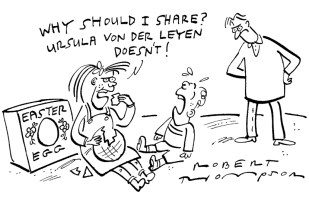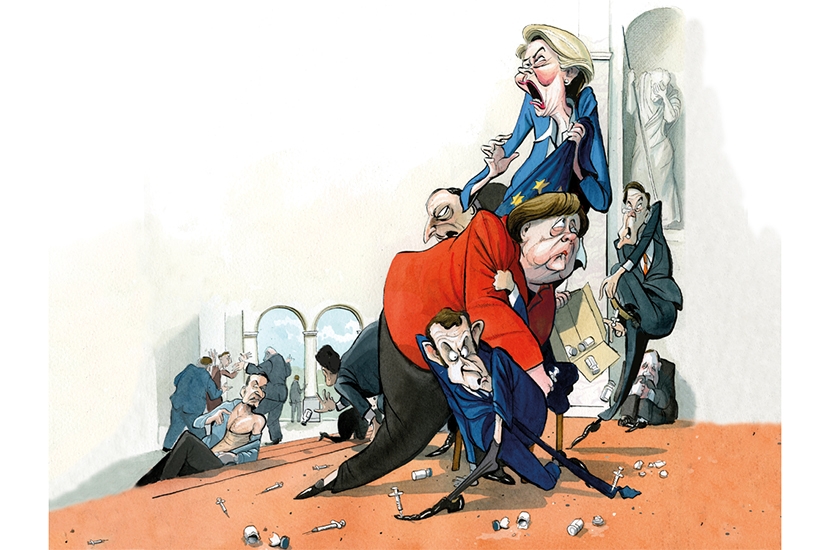The Dutch city of Leiden has rarely played a dramatic role in European history. Quiet, rainy and tucked away close to the sea, it is in many ways the Durham of the Continent. It was besieged by the Spanish in the Eighty Years’ War, Rembrandt was born and worked there, Einstein taught intermittently at its university — and that is about it. Yet this week Leiden is at the centre of European politics, and in a way that almost no one could have expected.
In the city’s science park, the biotech company Halix has a crucial role in manufacturing the Oxford-AstraZeneca Covid-19 vaccine. The European Union threatened to seize control of the plant, demanding that all its output be diverted from Britain to the Continent. If this happens, despite a seeming truce on Wednesday evening, it will be the moment at which the global vaccine wars that have been simmering for the past few months turn, in the language of military strategists, from cold to hot.
And yet beyond the day-to-day drama of which country gets which vaccine first, there is a bigger, more significant story playing out. The EU is in a blind panic as its jabs catastrophe gets worse and worse. What started out as a pharmaceutical crisis is rapidly turning into a series of far bigger public health, economic and political disasters.

This week’s summit of the bloc’s leaders, which aimed to get Europe’s vaccination programme back on track, instead showed how badly it has gone wrong. Britain has vaccinated more than half its adult population, and the United States is close to 40 per cent. Both countries have been rewarded with rapidly falling numbers of infections, hospital admissions and deaths. But EU countries lag far behind. In France, Germany, Italy and Spain, less than 15 per cent of their adult populations have been jabbed.
The EU’s vaccine campaign has been made up of blunders that would be almost comic, were the medical emergency not so serious. An obscure Cypriot party hack, appointed Health Commissioner, was put in charge of the procurement programme, too little money was spent, the focus was on the wrong risks, authorisation was too slow and, to cap it all, many of the EU’s leaders then undermined public faith in the one vaccine — the Oxford — that was going to save them. Last weekend, France and Germany hardly vaccinated anyone. The response? Amid a shortage of supplies that is completely its own fault, the EU is resorting to export controls and bans. A shipment of 250,000 doses to Australia has already been stopped, and exports to the UK were next in line. On Wednesday, the UK and the EU pulled back from the brink of an all-out trade war, pledging to work together to increase the supply for everyone. But that came after Italian police had seized 29 million AstraZeneca doses they suspected might be bound for Britain. With that kind of tension still in the air, any truce is likely to be a fragile one.
One by one, the vaccine fallout is about to take out a generation of European leaders
On the surface, it is hard to understand why the EU is resorting to such extreme measures. According to the consultancy firm Airfinity, even if the EU does ban exports, it will gain only an extra week of supply, while the British will lose two months. The political and economic price will be high. The EU will trash its reputation as a place in which to do business. Why base a plant in somewhere such as Leiden if the authorities will seize control of production lines whenever it is convenient? If these contracts get overridden by bureaucratic fiat, then so can any other agreement. (After all, if the AstraZeneca deal with the EU was legally binding, the company would have been hauled before a judge in Brussels by now.) The EU risks turning itself into a pirate state, for very little gain, which helps explain why smaller countries that depend on multinational investment, such as Ireland, have become nervous. Blind panic is the only explanation that makes sense.
The EU now faces three colliding crises. First, and most obviously, there is an unfolding public health disaster. A third wave of Covid-19, driven by mutations from Brazil, South Africa and Kent, is hitting an unvaccinated population. ICU units in northern Italy and Paris risk being overwhelmed again. Much of France has gone back into lockdown, and so has Italy, while Germany will close down shops over the Easter break in an attempt to control the spread of the virus. While the UK, the US and Israel are finally coming out of the crisis, the EU is going back into it, with nothing to show for the past year of hardship. As long as the virus circulates, there is no guarantee it can get out of the mess. Brazil has shown that without vaccines, countries can simply get hit by wave after wave.
Second, this crisis is about to turn into an economic disaster. The longer economies remain locked down, the more debt they run up, and the more long-term damage is done to businesses that are forced to close. The OECD has already scaled back growth forecasts for all the main eurozone economies, and that is only going to get worse as more restrictions are put in place. Governments will have to borrow more to keep economies afloat, and will do so in a global capital market where most of Asia and North America are growing again (not to mention that increasingly infuriating, rainy little island to the north-west of the Continent).
Meanwhile the EU’s much-touted coronavirus rescue fund looks puny compared with the stimulus programme unleashed by Joe Biden. Keep in mind that the third and fourth largest debtors in the world, measured by the total amount they owe, are within the EU — France and Italy. When every other country is borrowing like crazy, no one notices too much; when just one or two are, it is a different matter. A decade ago, the markets suddenly latched on to Greek extravagance, and the euro debt crisis engulfed the single currency. This time around, the vaccine catastrophe could trigger a wider financial crisis.
Finally, these public health and economic disasters threaten a political crisis as well. It hardly helps that the EU’s key member states have elections coming up. In Germany, Angela Merkel, Chancellor for the past 16 years, is standing down at the federal elections in September. Her party, the CDU, is getting hammered in the polls and in regional votes. The Greens are in the ascendant and their charismatic leader Robert Habeck, a kind of Teutonic Tony Blair, looks increasingly likely to claim the chancellorship. Germany’s Greens are very centrist these days — probably slightly to the right of Boris Johnson’s Conservatives, even on environmental issues — but that is still a sea-change.
Ursula von der Leyen is, of course, a stalwart of CDU politics. She has always been Merkel’s ‘mini-Mutti’, and her party will never forgive her if her ineptitude takes them out of power. In France, it is only a year until the next presidential election, and Emmanuel Macron’s chances of retaining the presidency are slipping away with every fresh lockdown. If he finds himself in a run-off against Marine Le Pen he may just survive: against a more credible candidate he will lose and his party will evaporate with him. In Italy, the former European Central Bank president Mario Draghi has just taken office, but the virus is proving a lot harder to tame than the bond markets ever were. What is the point of an unelected technocrat if he can’t get jabs into people’s arms? One by one, the vaccine fallout is about to take out a generation of European leaders.
But the real casualty will be the Commission in Brussels. It has long been a mantra of federalists that the EU advances in a crisis. It fully expected Covid-19 to deliver it more authority, the same way every moment of disruption had done in the past. The Commission would take control of health policy, with all the extra power that comes with it, while the Rescue Fund would allow it to hijack fiscal policy as well. Right now, that is in tatters. The EU (probably) won’t collapse. And yet it may start to unravel, and sometimes that can be the same thing. If it does come apart, the threatened seizure of an obscure factory in Leiden may well prove the moment it all started.






Comments